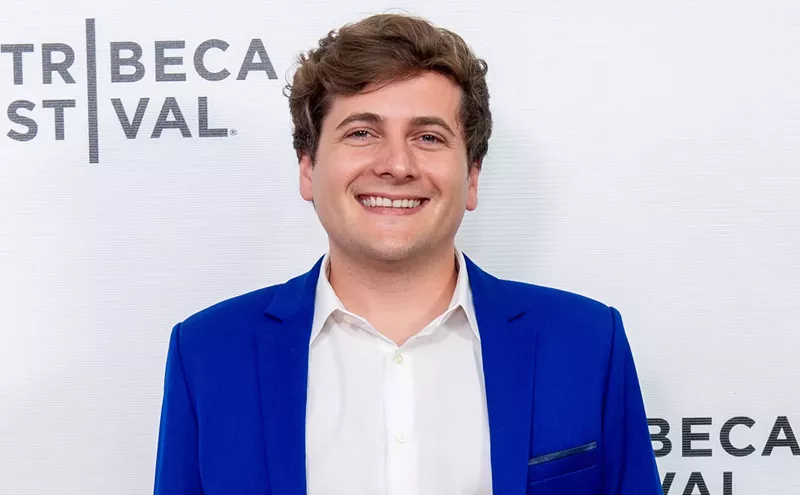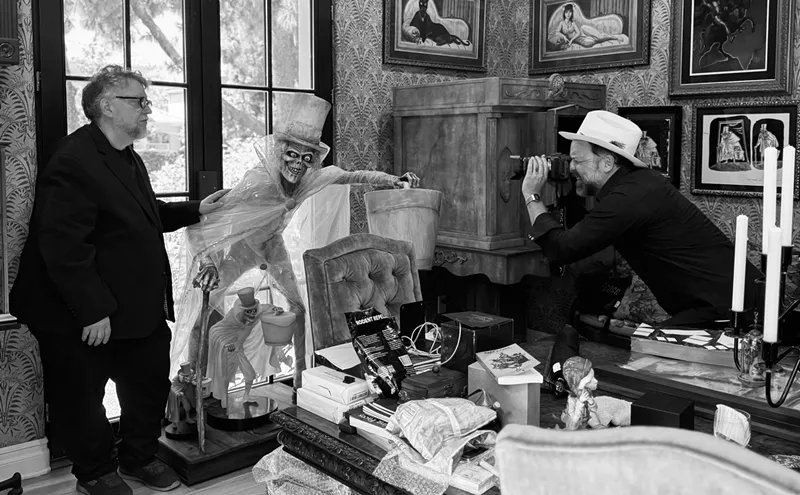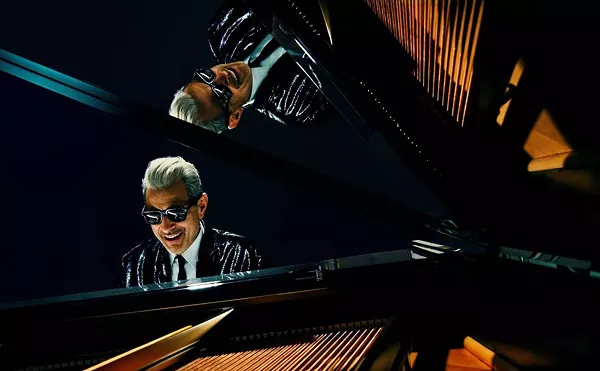I wasn't alone when I arrived at the opening night of performance artist Fred Curchack's latest one-man symphony, The Comeback of Freddy Chickan: I brought the remnants of a hellacious flu spell with me. High on Tylenol, cough medicine, and copious amounts of vitamin C, I staggered through the doors of the McKinney Avenue Contemporary to discover that Curchack had started the performance well before curtain time. Decked out in a raincoat, hat, black specs, and a tough-guy voice, moving from ticket buyer to ticket buyer and asking them random questions whose answers would be incorporated into the show, Curchack didn't just knock down that fabled fourth wall. He was smashing it to bits with a sledgehammer.
Terrified both of my own chemical- and viral-induced stupor and Curchack's reputation as a man who doesn't suffer critics gladly, I ducked into the rest room and waited there for about 10 minutes until the door to the theater was opened.
Paranoid? Cowardly? Perhaps, but to plead my case, I call Dallas Morning News staffer Jerome Weeks as the defense's No. 1 witness. A while back, Weeks wrote a column about how Curchack, who has an international reputation--with the awards and press clips to prove it--singled out Weeks at a performance after the writer had printed an unfavorable assessment of a previous show. Curchack literally dragged Weeks on stage and proceeded to harangue him with sarcastic cries such as "The critic is God! Bow down to the critic!"
Animosity by artists toward critics probably dates back to the first Australopithecine who got a rock to the cranium from some disgruntled listener who didn't like his account of the day's hunt. Three-time Pulitzer-winning playwright Edward Albee spiced his presentation at the Dallas Museum of Art last year with some truly tasty peppercorns of spleen about those who toil in the name of what W.H. Auden called "prejudice made plausible."
And yet for the fascinating, fiery Curchack, that's not the end of the story. When his shows rely heavily on an improvisational element, he prowls back and forth across the stage like a hungry panther, eliciting audience participation disguised as characters who can be loud, angry, impatient, and demanding. The effect doesn't feel meanspirited as much as needy. Curchack the performance artist has seemingly punctured the delicate membrane that separates every performer's lust for approval from his or her artistic voice. The man certainly doesn't lack talent, nor belief in that talent, but into the sloppy, zesty mixing bowl of his shows he has folded a vulnerability that borders on exhibitionism.
Nowhere is this more apparent than in The Comeback of Freddy Chickan. This is a rewrite of a show called The Inquest of Freddy Chickan that was first performed a dozen years ago. The title character is a superstar of stage, movie screen, and television who has made an abrupt disappearance, leaving behind a series of characters who wax eloquent on his significance in their lives. Besides the aforementioned detective who follows, there's a sunglassed, black-tressed Italian beauty who was co-star and lover to Mr. Chickan; a silver-haired, cancer-ridden film director who is obsessed with reviving Freddy's movie career; Freddy's agent, a wine-sipping New Yawker in a multicolored fright wig who insists, "Image is everything, and I did it all for Freddy"; and Freddy's psychiatrist, who projects images of Mr. Chickan's (Mr. Curchack's) childhood, young adulthood, and career on the back screen while he diagnoses the hidden star's neuroses.
Right about this time, the schizophrenic sense of wonder that has marked Curchack's creations gives way to a rather ravenous ego. Curchack has wowed us with his voices, gestures, off-the-cuff dialogue, and his fantastic mastery of light and shadow play. (With just a flashlight and a sheet between him and the audience, he can simulate shrinking, expanding, body-morphing, and all manner of startling metamorphoses.) He has already harped on a series of issues that, we can only assume, are at least semiautobiographical--a compulsive need to interpret audience reaction even as the audience interprets him; and a disappointment, real or feigned, with languishing in "little theaters like these" and not achieving more widespread recognition. These recurrent themes combined with This Is Your Life photos projected behind the psychiatrist start to make you a little suspicious.
Unfortunately, suspicion turns to dread when Freddy Chickan makes his appearance in the final vignette. By this point the audience had pretty much established itself as not altogether enthusiastic performance partners. Granted, Freddy is supposed to be obnoxious, but Curchack turns the volume on that one all the way to 11 and climaxes his act with a gibberish-spouting breakdown that suggests two rodent metaphors--after Chickan/Curchack has grown belligerent as a trapped rat, he abandons the show like it was a sinking ship.
Fred Curchack has earned ecstatic press from hallowed sources such as The New York Times and various prestigious European performance festivals. These were not flukes:He oozes a florid theatricality from every pore, constructing his one-man shows with a childlike attention to the pleasures of the human imagination and a disciplined artist's knowledge of how to translate them into gutbucket theatrical extravaganzas
In short, Curchack has the guts to do whatever the hell he pleases, and the chops to transform it into theatrical revelation. The Comeback of Freddy Chickan continues that admirable tradition. But the viewer suspects Curchack is running amuck here, outfitting his colorful characters with some personal baggage that might be better unloaded on a psychiatrist's couch--or, at the very least, paraded on stage in more objective, universal guises. In the opening-night performance I saw, Curchack's naked alter ego Freddy Chickan seemed on the verge of throwing a tantrum because the hesitant audience did not provide the stimulation his improvisatory passages so desperately needed.
That is the danger and the thrill of improvisation: You never know how much the ticket buyers will give you, and how much you'll have to supply on your own. Vivacious, eager-to-please, insistent Freddy didn't appear to have bargained for that, and grew visibly agitated. Since Curchack took great pains to step out of the material and identify Mr. Chickan as a thinly veiled variation of himself, his desperation seemed that much more bizarre--and, in light of the superb stuff that preceded it, off-putting.
The Comeback of Freddy Chickan runs through September 1 at the McKinney Avenue Contemporary, 3120 McKinney Avenue. Call 953-1212.












